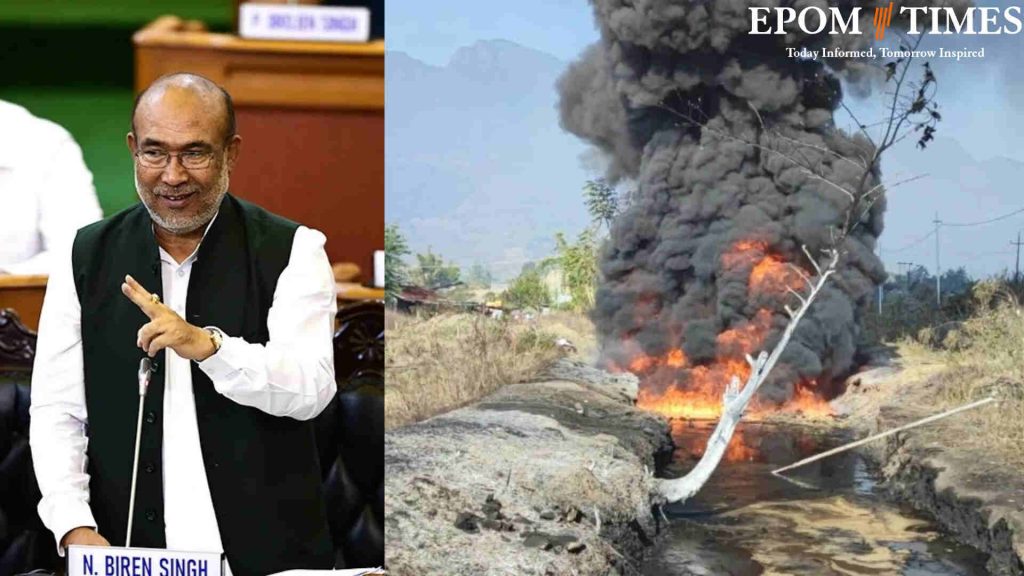
Leakage of substantial fuel from the Leimakhong Heavy Fuel Power Station, deliberately released into the nearby Kanto Sabal canal on January 11, was orchestrated by certain individuals, deemed a “crime against humanity” by Chief Minister N Biren during the State Assembly session today.
Responding to a call for attention motion raised by Opposition MLAs K Ranjit and Th Lokeshwar regarding the oil leakage from Leimakhong Heavy Fuel Power Station, N Biren, also overseeing the Home Department, expressed that the Government is actively working to apprehend all those involved in this particular act of sabotage.
Despite the registration of two FIRs in connection with the incident, the police are currently unable to apprehend the culprits due to restrictions in certain areas during the ongoing crisis.
Describing the act of sabotage as a severe crime, Biren asserted that the Government is diligently working to hold the culprits accountable. The Leimakhong heavy fuel power station is presently under police custody, along with IRB, as he informed the House.
“On observing the visual evidence of a substantial layer of oil flowing down the canal, I communicated with Minister Dingo and the local Pradhan, directing them to divert the canal’s water to a nearby field. Minister Susindro was also dispatched, accompanied by additional police forces. This preventive measure was crucial before the canal’s contaminated water could reach rivers, averting a potential catastrophe,” Biren stated.
Union Home Minister Amit Shah also dispatched a number of experts from the Centre, and concerted efforts were made to minimize the impacts of the sabotage, he reported.
In response to the same call for attention motion, Power Minister Th Biswajit revealed that the Leimakhong heavy fuel power station was established in 1998 after the Planning Commission allocated Rs 125 crore from NLCPR to alleviate the burden on the State Government in purchasing power.
Operating on three types of oil – high-speed diesel, low-speed diesel, and furnace oil – these fuels were initially inexpensive. However, after the Government of India decontrolled petroleum product prices, furnace oil skyrocketed to Rs 40.25 per litre, while diesel rose to Rs 57.2 per litre, Biswajit disclosed.
As the cost of purchasing fuels surpassed the cost of purchasing power, the Leimakhong heavy fuel power station was deactivated in 2012, he stated.
In light of the substantial fuel leakage from the power station into the nearby canal, the Government made every effort to prevent the fuels from reaching rivers. Even the DGP of the power station faced suspension.
A team comprising the Coast Guard and IIIT Guwahati conducted a spot assessment of the leakage on January 12. Subsequently, a joint team from PHED, Water Resources, Environment & Climate Change, and Power visited the site the next day, launching an investigation, as shared by Biswajit.
IIIT Guwahati and other experts recommended the State Government to remove the unused fuels stored in the power station. The IIIT Guwahati team visited the site three times, submitting a comprehensive report to the State Government, he added.
Following a Cabinet meeting, the State Government consulted the Pune-based Oil Spill Combat Team (OSCT). After scrutinizing the oil leakage site and its effects, the OSCT has submitted six reports to the Government, as conveyed to the House. A committee led by an IG of Manipur Police also probed the oil leakage.
Upon close examination, it was discerned that the pipe connected to the fuel tank was intentionally severed. Consequently, the substantial fuel flowed into the nearby stream. Investigative teams will unveil all the details, Biswajit asserted. Periodic tests of water contaminated by the oil spill indicate no cause for alarm.
A water sample contaminated by the oil spill was tested on February 27, revealing an oil/grease content of 0.08 per cent. Therefore, the water is now considered harmless, he affirmed.
Raising the call for attention motion, K Ranjit referenced media reports from the Manipur Human Rights Commission, stating that the oil spill was a result of sabotage, not an accident. He proceeded to question whether the fuel pipeline of the power station was deliberately severed to cause widespread destruction in the valley areas. Additionally, he inquired about the high-level committee formed by the Government to investigate the incident, emphasizing that the Leimakhong sabotage was a crime against humanity.


